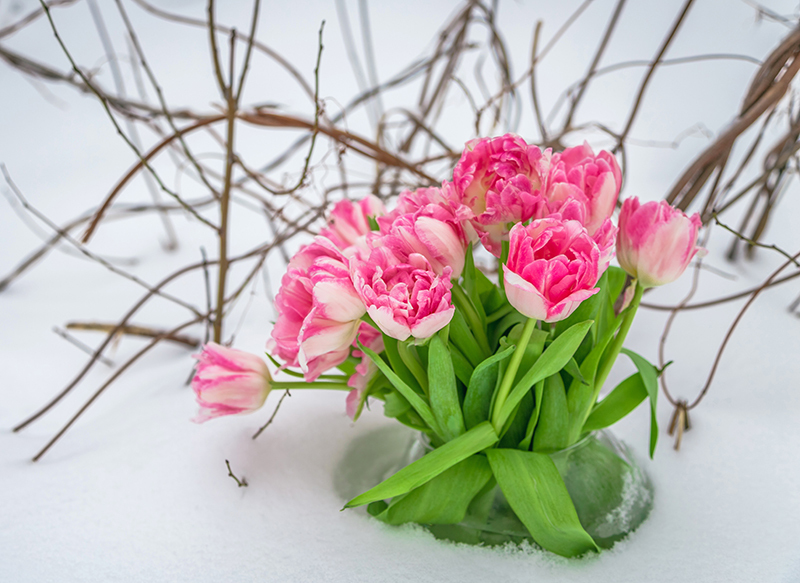Delving into Peony Flowers' Symbolism and the Power of Their Colors
Posted on 17/08/2025
Delving into Peony Flowers' Symbolism and the Power of Their Colors
Peony flowers have captivated gardeners, artists, and romantics for centuries. Their lush, rounded blooms and intoxicating fragrance have made them a classic in floral arrangements and gardens worldwide. But beyond their undeniable beauty lies a depth of meaning and symbolism, carried through history and expressed through their astonishing array of colors. In this comprehensive guide, we will delve into peony flowers' symbolism and explore how their colors add layers of profound significance, making them more than just a feast for the eyes.

Understanding the Peony Flower: More Than Just a Bloom
Native to Asia, Europe, and Western North America, the peony flower belongs to the genus Paeonia. With over 30 species and hundreds of cultivars, peonies can be found in herbaceous, tree, and intersectional forms, each variety boasting its own unique charm. But why has the peony become such a storied flower in the tapestry of human culture?
- Long Lifespan: Many peonies can live for decades, representing resilience and continuity.
- Vibrant Colors: Peonies span a spectrum of colors, each one imbued with symbolism.
- Global Reverence: Peonies feature prominently in art, folklore, and celebrations worldwide, especially in China and Japan.
The Peony in Historical Context
The symbolic meaning of peonies can be traced back thousands of years. In ancient China, they were dubbed the "king of flowers," associated with wealth, honor, and high society. The flower frequently graced royal gardens and imperial robes. In the Western world, peonies symbolized healing and were believed to possess mystical powers to ward off evil spirits.
As centuries passed, the language of flowers--known as floriography--gave new emphasis to the peony's meaning. Whether used in Victorian bouquets or modern-day weddings, the symbolism of peonies remains just as relevant as ever.
The Heart of Symbolism: Peony Meanings Across Cultures
Peonies in Eastern Cultures
- China: Peonies, or mudan (??), are the national flower and a symbol of prosperity, nobility, and honor. They are seen as an omen of good fortune, especially in matters of love and marriage. The peony often features in traditional art, signifying feminine beauty and high social status.
- Japan: The peony, or botan (??), is a beloved subject in Japanese art and tattoo culture, standing for bravery, good fortune, and respectability. It is often depicted alongside lions or dragons as a symbol of protection and strength.
Western Symbolism of Peony Flowers
- Romantic Love: Peonies are associated with romance, bashfulness, and a happy marriage. Their presence at weddings is believed to bless the couple with good fortune and affection.
- Healing: Historical traditions saw peonies as a remedy for ailments, symbolizing healing, protection, and safeguarding against harm.
- Luxury and Opulence: In art and design, clusters of peony flowers signify wealth, abundance, and prosperous living.
The Power of Peony Flower Colors: Meanings and Symbolism

One of the most enchanting aspects of peonies is their color spectrum. Each hue conveys a specific message or blessing, making these flowers a powerful tool for communication without words. Here's a breakdown of what the most popular peony flower colors mean:
Pink Peonies: Love, Romance, and Good Fortune
Pink peonies are among the most beloved, symbolizing romantic love, youthful beauty, and good luck. In wedding bouquets and anniversary arrangements, the pink peony conveys well-wishes for a long and affectionate partnership. In Chinese culture, their association with feminine energy and virtuous beauty makes them a fitting choice for celebrating women's achievements and milestones.
- Best Occasions: Weddings, anniversaries, birthdays, engagements.
- Pairing: Combine with white for purity, or red for passion.
White Peonies: Purity, Apology, and New Beginnings
The white peony glows with understated elegance, bringing forth symbolism of purity, innocence, and honest intentions. These peonies are often gifted for new beginnings--such as a new home or a baby's arrival--or to communicate apologies and wishes for peace. Their serene beauty lends itself to reflection, remembrance, and sacred occasions.
- Best Occasions: Births, memorial services, christenings, peace offerings.
- Pairing: Accentuate with pale pinks or greens for tranquility.
Red Peonies: Passion, Respect, and Honor
Across cultures, red peonies ignite passion and celebrate respect, honor, and romantic love. In China, red is the color of good fortune and prosperity, making red peonies the centerpiece of festivals and ceremonies. In Western bouquets, they carry strong romantic connotations, similar to red roses, and can be used to demonstrate deep affection and admiration.
- Best Occasions: Valentine's Day, promotions, triumphs, romantic gestures.
- Pairing: Complement with gold or white for grandeur.
Purple Peonies: Mystery, Nobility, and Success
Once reserved for royalty, purple peonies suggest mystery, dignity, and higher wisdom. A bouquet of purple peonies can symbolize admiration for someone's achievements, or celebrate personal growth and transformation. Their regal essence makes them suitable for congratulating academic or career milestones.
- Best Occasions: Graduations, work promotions, elder appreciation.
- Pairing: Use with blue or dark foliage for depth.
Yellow and Coral Peonies: Friendship, Freshness, and Healing
Yellow and coral peonies stand for cheerfulness, hopeful energy, and deep friendship. These vibrant hues are perfect for brightening someone's day or encouraging optimism after a difficult time. In healing settings, yellow peonies are thought to restore vitality and happiness.
- Best Occasions: Get-well-soon gifts, gratitude celebrations, friendship anniversaries.
- Pairing: Accent with soft pinks for a warm, inviting effect.
The Many Uses of Peonies: From Gardens to Meaningful Gifts
Peonies in the Garden
Gardeners cherish peony flowers not only for their beauty but also for the symbolic aura they bestow on outdoor spaces. Thanks to their perennial nature, a mature peony plant can bloom vibrantly for decades, sometimes even outlasting those who planted them. In Feng Shui, planting peonies near the front of your home is said to attract love and positive energy into the household.
Peonies as Cut Flowers and Gifts
- Celebrations: Their varied meanings make peonies an ideal choice for nearly any celebration, adding depth to your gesture.
- Apologies or Reconciliation: White or pink peonies offer a gentle, sincere way to make amends.
- Sympathy Arrangements: Softly colored peonies offer comfort and remembrance during trying times.
Tip: To preserve the symbolic power of your peony gift, consider including a note explaining the meaning behind your chosen color.
Peonies in Art, Literature, and Design
Peonies often appear in paintings and embroidery, symbolizing fleeting beauty and the riches of life. Literary works, such as classic Chinese poems, use the flower's lushness as a metaphor for unattainable love or transient joy. In contemporary design, peonies are a leading motif for wedding invitations, textiles, and home decor.
Peony Superstitions, Legends, and Interesting Facts
Legend of the Peony's Origin
According to Greek mythology, the peony is named after Paeon, a physician to the gods who used the peony's roots to heal war wounds. Jealous, Apollo tried to slay him, but Zeus turned Paeon into the peony flower to spare him. This tale embodies the healing, protective properties associated with peonies.
Good Luck Charms
In many cultures, peonies are thought to invite good luck, wealth, and happiness into the home. It is especially lucky to have peony flowers bloom on the day of an important event, such as a wedding or the birth of a child.
Scarcity and Luxury
Historically, only nobility could afford to cultivate large peony gardens. The rarity and size of the blooms made them a symbol of luxury and prestige--an association that persists today.

Growing Peonies: Cultivating Symbolism in Your Own Space
If you want to enjoy the beauty and meaning of peony flowers firsthand, consider planting them in your garden. Here's a brief guide to get you started:
- Climate: Peonies thrive in temperate climates with cold winters and warm springs.
- Soil: Well-drained, fertile soil with a neutral pH is best.
- Planting Time: Fall is ideal for planting tubers, ensuring strong root growth.
- Sunlight: Full sun yields the best blooms, though some afternoon shade can protect flowers from fading.
- Care Tip: Remove spent blooms and stake taller varieties to prevent drooping.
As your peony plant matures, it will reward you with lush flowers that reflect all the meanings and symbolism discussed above. Whether for your own sanctuary or as a heartfelt gift, cultivating peonies is a living way to bring their legacy into the present.
Conclusion: The Enduring Magic of Peony Flowers and Their Symbolic Colors
When we delve into peony flowers' symbolism and the power of their colors, we uncover more than decorative blooms--we find a language of emotions, wishes, and dreams. From their ancient origins to their celebrated place in modern life, peonies encapsulate the finest human aspirations: love, honor, good health, prosperity, and friendship. The next time you see or gift a peony, remember the depth of meaning contained in each lush petal, and let its color speak volumes in the language of flowers.
- Pink Peonies: For love, romance, and joy.
- White Peonies: For new beginnings and forgiveness.
- Red Peonies: For passion, honor, and blessings.
- Purple Peonies: For nobility and admiration.
- Yellow/Coral Peonies: For friendship and optimism.
In embracing peonies--whether in gardens, artwork, or as thoughtful gifts--we celebrate the rich tapestry of meaning they have woven through the centuries. Their lush blossoms are a tribute to beauty, resilience, and everything we hold dear.







